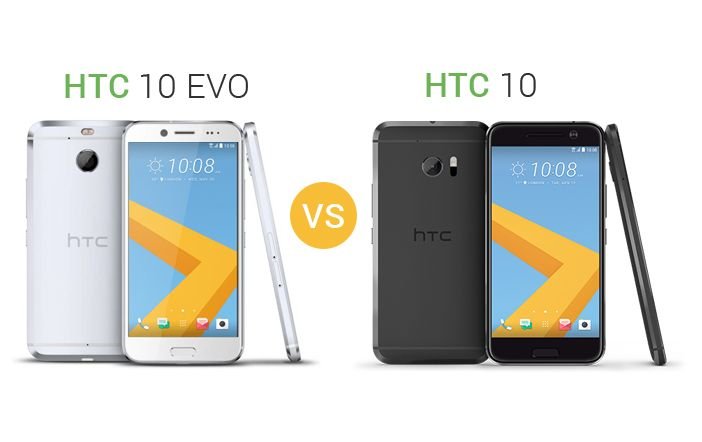HTC has released the new HTC 10 evo smartphone in Taiwan. HTC 10 evo is the international variant of the HTC Bolt smartphone that was recently launched in the US. It is expected to get launched in India quite soon.
HTC 10 evo is a new addition to company’s portfolio. It features a beautiful metal unibody design. The smartphone carries a set of specifications which are similar as the HTC Bolt. But, does it has a chance to get compared with the flagship HTC 10? Here’s the comparison in between two latest mobiles which will help you deciding which one should you buy?
Design
Both HTC Mobiles, the HTC 10 evo and HTC 10 offer premium, firm, and all-metal unibody design with chamfered finish at the edges. Both features the fingerprint sensors on the front panel and USB Type-C port at the bottom,
A large circular camera with dual LED flash is present on the rear of both smartphones. The HTC 10 evo is slightly larger and heavier than the HTC 10. The noteworthy difference in between these two latest mobiles is the IP57 rating of HTC 10 evo which makes it water resistant, which HTC 10 can’t perform.
Display
The HTC 10 evo offers a 5.5-inch QuadHD (1440×2560 pixels) Super LCD 3 display with 534ppi pixel density. The screen is protected by Corning Gorilla Glass 5 which is claimed to resist knocks and drops.
The HTC 10 smartphone offers a slightly smaller 5.2-inch QHD (1440×2560 pixels) Super LCD 5 display with higher pixel density at 564ppi. It also wears Corning Gorilla Glass protection on top.
Price
The HTC 10 Evo is now available for pre-orders in Taiwan and is priced at TWD 17,990 (roughly Rs 38,500) for the 32GB variant and TWD 19,900 (roughly Rs 43,000) for 64GB variant.
The HTC 10 was launched in India earlier this year and was priced at Rs 52,990. The company later slashed down the price of the smartphone by Rs 5,000 to Rs 47,990. The HTC 10 smartphone is now available at the lowest price of Rs 39,999 on Snapdeal for 32GB model.
Camera
The HTC 10 evo features a 16MP primary rear camera with 28mm focal length and f/2.0 aperture. The smartphone offers manual controls, phase detection autofocus with 0.3-second focusing capabilities, and optical image stabilization. On the front, there is an 8MP sensor with 29mm focal length, Auto HDR, and f/2.4 aperture.
The HTC 10 offers a 12MP primary rear camera with a 26mm focal length, 1.55µm pixels, 80-degree wide angle lens, and f/1.8 aperture. It features laser autofocus, OIS, manual controls and RAW capture capabilities. On the front, there is a 5MP camera with a 23mm focal length, 1.34µm pixels, 86-degree wide angle lens, and f/1.8 aperture. The device also features Auto HDR capture and OIS.
Hardware Specifications
The major difference in between HTC 10 evo and HTC 10 lies in its hardware. The HTC 10 evo is equipped with 2015’s Qualcomm Snapdragon 810 processor whereas the HTC 10 features Snapdragon 820 chip. The HTC 10 evo comes with 3GB of RAM and 32GB or 64GB of internal storage specifications, while HTC 10 has 4GB of RAM and storage options of 32GB or 64GB. Both the smartphones could support microSD cards up to 2TB; however, HTC 10 offers Marshmallow’s Flex storage.
The HTC 10 evo packs a 3200mAh battery under the hood, while HTC 10 offers a 3000mAh battery. Both the smartphones offers Hi-Res Audio support. HTC 10 features BoomSound Hi-Fi Edition and Dolby Audio, while HTC 10 evo has HTC’s BoomSound Adaptive Audio. For headphones, both smartphones offer Hi-Res Audio. The HTC 10 evo uses USB Type-C port for its headphones, whereas HTC 10 uses 3.5mm audio jack.
Software
The HTC 10 evo runs on the latest Android 7.0 Nougat OS with HTC Sense. The HTC 10 runs on Android 6.0 Marshmallow OS with HTC Sense, though the smartphone will get software updates to the latest version soon.
Verdict
The HTC 10 is lighter, smaller, has more RAM, a better, sharper, display and better audio options. Along with a a wider aperture on both the camerasit offers OIS on the front. Another perk of the mobile is that it offers a newer, more powerful chipset to power the handset.
The HTC 10 Evo on the other hand has a larger battery capacity, a larger screen, higher resolution front and rear cameras. The Evo offers adaptive audio to automatically tune the headphones to your ears and importantly, offers that IP57 rating.




